NEWS ROUNDUP
Hiring at Hanford ● Our public option ● Trump’s trade war
Monday, May 13, 2019
LOCAL
 ► In today’s Tri-City Herald — 17 years after work started on a $17 billion Hanford plant, crews are being hired to run it — Hiring is underway for some of the workers who likely will operate Hanford’s $17 billion vitrification plant. The hiring and training of workers to operate the plant is “a significant development on the path to finally beginning to treat Hanford’s toxic and radioactive tank waste,” said the state Department of Ecology, a Hanford regulator. The plant has been under construction since 2002.
► In today’s Tri-City Herald — 17 years after work started on a $17 billion Hanford plant, crews are being hired to run it — Hiring is underway for some of the workers who likely will operate Hanford’s $17 billion vitrification plant. The hiring and training of workers to operate the plant is “a significant development on the path to finally beginning to treat Hanford’s toxic and radioactive tank waste,” said the state Department of Ecology, a Hanford regulator. The plant has been under construction since 2002.
► In the (Everett) Herald — Teachers in Edmonds district are preparing to get pink slips — Leaders of Edmonds public schools will vote Tuesday on a plan to lay off teachers, elementary school assistant principals and paraeducators to help plug a projected $17.7 million hole in next year’s budget.
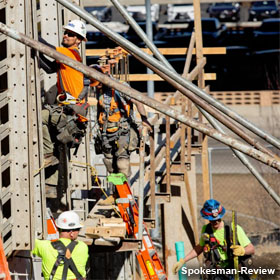 ► In today’s Spokesman-Review — Opportunity knocks: Spokane makes top 10 for median-wage employment without college degrees — More students used to take shop classes in junior high and high school, where they learned a trade and could enjoy working with their hands. Today, kids might consider Washington apprenticeship programs – which allow them to earn a decent wage while training – as opposed to being saddled with college debt. Jobs like this are a great example of “opportunity employment”; making at or above the national median wage ($37,690) without a bachelor’s degree. Spokane was ranked No. 9 for this type of employment, according to a new report.
► In today’s Spokesman-Review — Opportunity knocks: Spokane makes top 10 for median-wage employment without college degrees — More students used to take shop classes in junior high and high school, where they learned a trade and could enjoy working with their hands. Today, kids might consider Washington apprenticeship programs – which allow them to earn a decent wage while training – as opposed to being saddled with college debt. Jobs like this are a great example of “opportunity employment”; making at or above the national median wage ($37,690) without a bachelor’s degree. Spokane was ranked No. 9 for this type of employment, according to a new report.
► In today’s Bellingham Herald — Alcoa’s Intalco smelter agrees to reduce pollution emissions. Here’s what that means. — Alcoa’s aluminum smelter near Ferndale has agreed to a plan to install pollution equipment that will reduce sulfur dioxide releases.
► In today’s Seattle Times — What caused Seattle crane to collapse? Experts say a common practice is likely cause — Several crane experts, after closely examining photos and videos of the crash, said they believe pins were removed early. And, they say, it’s a practice that has become common in the industry — a way to save time during disassembly — despite the safety risks they say it brings.
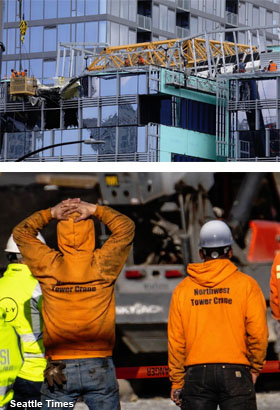 ► ICYMI, a MUST-READ last week in thr Seattle Times — Human error? Stop blaming workers for their own deaths (by Marissa Baker, Noah Seixas and Trevor Peckham) — Within hours, experts were already calling out human error as a likely culprit in the South Lake Union tragedy, which killed two ironworkers disassembling the crane and two people in cars on the street below. “I think there’s a 99% chance that this is a human error cause and not a structural or mechanical failure by the machine,” a construction safety expert told CNN. These kinds of statements — in essence, blaming the workers for their own deaths — are common following workplace accidents. They also grossly oversimplify the complex causes of on-the-job injuries and fatalities and the factors that contribute to them, most of which are beyond the control of any worker… Laying the blame for workplace incidents only on workers ignores the responsibility of management and corporate entities to ensure health and safety. An organizational commitment to safety at all levels is the most effective way to prevent such incidents. Workplace health and safety programs must be designed with the knowledge that people are fallible and errors will happen. Adequate coordination and communication in multi-employer worksites will be critically important in the modern fissured economy.
► ICYMI, a MUST-READ last week in thr Seattle Times — Human error? Stop blaming workers for their own deaths (by Marissa Baker, Noah Seixas and Trevor Peckham) — Within hours, experts were already calling out human error as a likely culprit in the South Lake Union tragedy, which killed two ironworkers disassembling the crane and two people in cars on the street below. “I think there’s a 99% chance that this is a human error cause and not a structural or mechanical failure by the machine,” a construction safety expert told CNN. These kinds of statements — in essence, blaming the workers for their own deaths — are common following workplace accidents. They also grossly oversimplify the complex causes of on-the-job injuries and fatalities and the factors that contribute to them, most of which are beyond the control of any worker… Laying the blame for workplace incidents only on workers ignores the responsibility of management and corporate entities to ensure health and safety. An organizational commitment to safety at all levels is the most effective way to prevent such incidents. Workplace health and safety programs must be designed with the knowledge that people are fallible and errors will happen. Adequate coordination and communication in multi-employer worksites will be critically important in the modern fissured economy.
THIS WASHINGTON
► From the AP — Washington to offer first ‘public option’ insurance in U.S. — Washington is set to become the first state to enter the private health insurance market with a universally available public option. A set of tiered public plans will cover standard services and are expected to be up to 10% cheaper than comparable private insurance, thanks in part to savings from a cap on rates paid to providers. But unlike existing government-managed plans, Washington’s public plans are set to be available to all residents regardless of income by 2021. The Legislature approved the plan last month, and Gov. Jay Inslee is scheduled to sign it into law Monday.
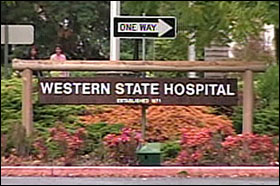 ► From the AP — Western State Hospital staff struggle with assault, chickenpox — While Washington’s lawmakers and governor celebrated their efforts to fix the state’s ailing mental health system, workers at the state’s largest psychiatric hospital struggled with a new assault, sewage flooding, excessive overtime and the spread of chickenpox that sent dozens of workers home without pay. On Sunday, a mental health therapist at Western State Hospital was hospitalized after a patient bit off part of her left thumb… Nurses at the Lakewood facility have worked an average of 154 hours of overtime each day in 2019 to operate at base staffing levels, according to an overtime report that covers up to the end of April and was acquired by The Associated Press. That’s an increase from the daily average of 149 hours for 2018.
► From the AP — Western State Hospital staff struggle with assault, chickenpox — While Washington’s lawmakers and governor celebrated their efforts to fix the state’s ailing mental health system, workers at the state’s largest psychiatric hospital struggled with a new assault, sewage flooding, excessive overtime and the spread of chickenpox that sent dozens of workers home without pay. On Sunday, a mental health therapist at Western State Hospital was hospitalized after a patient bit off part of her left thumb… Nurses at the Lakewood facility have worked an average of 154 hours of overtime each day in 2019 to operate at base staffing levels, according to an overtime report that covers up to the end of April and was acquired by The Associated Press. That’s an increase from the daily average of 149 hours for 2018.
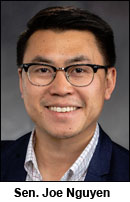 ► From HuffPost — Meet Washington state’s motorcycle enthusiast, rap-loving Asian American freshman senator — Sen. Joe Nguyen (D-West Seattle), the son of Vietnamese refugees, is not only the first Asian American senator in the state’s 34th District — he’s also the first person of color in that seat. He understands that his presence can be uncomfortable for a legislative body that’s unused to seeing someone from an underrepresented community in his seat. On top of that, his personality runs counter to the tired stereotypes long attached to Asian Americans.
► From HuffPost — Meet Washington state’s motorcycle enthusiast, rap-loving Asian American freshman senator — Sen. Joe Nguyen (D-West Seattle), the son of Vietnamese refugees, is not only the first Asian American senator in the state’s 34th District — he’s also the first person of color in that seat. He understands that his presence can be uncomfortable for a legislative body that’s unused to seeing someone from an underrepresented community in his seat. On top of that, his personality runs counter to the tired stereotypes long attached to Asian Americans.
► From HuffPost — The socialist truck driver running for Congress on a Green New Deal — Joshua Collins, 25, is making a long-shot bid to unseat Rep. Denny Heck (D-Wash.), betting a left-wing platform can make him the youngest member of Congress.
THAT WASHINGTON
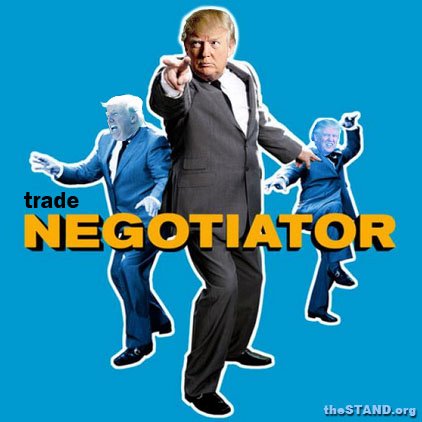 ► In today’s Washington Post — Trump’s trade approach under attack as China retaliates on tariffs; markets open with big sell-off — Trump’s efforts to calm investors while he launches a full-scale trade war with China showed signs of cracking Monday, as one of his top advisers admitted the approach could damage the U.S. economy, a Goldman Sachs report predicted it might lead to higher interest rates and China vowed to impose tariffs on $60 billion in U.S. goods on June 1… Amid signs that investors were questioning his adversarial approach, Trump attempted to assuage the public in a series of Twitter posts. But some of his posts contained typos and misspellings, suggesting his comments hadn’t been thoroughly vetted by White House officials and might not represent fully planned out policy initiatives.
► In today’s Washington Post — Trump’s trade approach under attack as China retaliates on tariffs; markets open with big sell-off — Trump’s efforts to calm investors while he launches a full-scale trade war with China showed signs of cracking Monday, as one of his top advisers admitted the approach could damage the U.S. economy, a Goldman Sachs report predicted it might lead to higher interest rates and China vowed to impose tariffs on $60 billion in U.S. goods on June 1… Amid signs that investors were questioning his adversarial approach, Trump attempted to assuage the public in a series of Twitter posts. But some of his posts contained typos and misspellings, suggesting his comments hadn’t been thoroughly vetted by White House officials and might not represent fully planned out policy initiatives.
 ► From HuffPost — Trump seeks new $15 billion subsidy to protect farmers from his own trade war — Trump is seeking an additional $15 billion in U.S. subsidies in an effort to protect farmers from the devastating impact of his trade war with China. That’s on top of $12 billion already earmarked for the farmers to help them weather the fallout.
► From HuffPost — Trump seeks new $15 billion subsidy to protect farmers from his own trade war — Trump is seeking an additional $15 billion in U.S. subsidies in an effort to protect farmers from the devastating impact of his trade war with China. That’s on top of $12 billion already earmarked for the farmers to help them weather the fallout.
► In today’s Washington Post — Trump’s go-it-alone approach on trade and immigration poses economic risks — The president has taken risky moves to pull free from Congress, seeking to cast himself as a defiant chief executive willing to act alone, no matter the global repercussions.
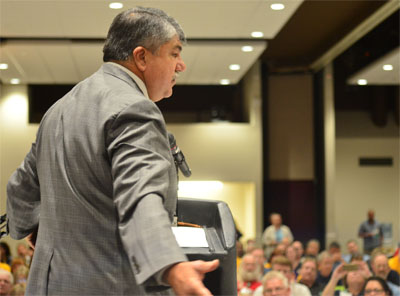 ► From the AP — Risky politics? Trump wields his tariffs as a weapon at home — AFL-CIO President Richard Trumka said Democratic weakness on trade was part of the reason Trump won in 2016 — because his Democratic opponent wasn’t strong enough in condemning deals perceived by some as helping other countries more than the U.S. He warned Democrats not to make the same mistake again. “If they cede that territory, they are doing so at their own peril,” Trumka said. “They need to talk more effectively about trade and convince people that they’re going to stand up for workers, that we’re not going to continue down the road we’ve been on.”
► From the AP — Risky politics? Trump wields his tariffs as a weapon at home — AFL-CIO President Richard Trumka said Democratic weakness on trade was part of the reason Trump won in 2016 — because his Democratic opponent wasn’t strong enough in condemning deals perceived by some as helping other countries more than the U.S. He warned Democrats not to make the same mistake again. “If they cede that territory, they are doing so at their own peril,” Trumka said. “They need to talk more effectively about trade and convince people that they’re going to stand up for workers, that we’re not going to continue down the road we’ve been on.”
NATIONAL
 ► From Rolling Stone — There’s a Musician’s Union. Many musicians are unaware — or unable to join. — A wave of workers-first rhetoric is sweeping through multiple creative industries at the moment, reaching all the way to the highest levels of pop stardom. But there’s an odd disconnect. While everyone’s talking the unions’ language, not many artists are talking about the unions themselves. In fact, two organizations that are supposed to provide musicians with collective power already exist: SAG-AFTRA, which covers around 5,000 vocalists, and the American Federation of Musicians (AFM), which covers around 70,000 instrumentalists… This clearly poses a challenge to SAG-AFTRA (and the AFM as well). It’s crucial for these organizations to exploit the growing militancy of their potential membership.
► From Rolling Stone — There’s a Musician’s Union. Many musicians are unaware — or unable to join. — A wave of workers-first rhetoric is sweeping through multiple creative industries at the moment, reaching all the way to the highest levels of pop stardom. But there’s an odd disconnect. While everyone’s talking the unions’ language, not many artists are talking about the unions themselves. In fact, two organizations that are supposed to provide musicians with collective power already exist: SAG-AFTRA, which covers around 5,000 vocalists, and the American Federation of Musicians (AFM), which covers around 70,000 instrumentalists… This clearly poses a challenge to SAG-AFTRA (and the AFM as well). It’s crucial for these organizations to exploit the growing militancy of their potential membership.
► From WHDH Boston — Strike looming at local Macy’s locations — After four months of negotiations, union workers at Macy’s stores in Massachusetts and Rhode Island have voted to strike if they are not given better benefits and philanthropic opportunities.
TODAY’S MUST-READ
 ► In the Bangor Daily News — Unions make Maine – and America – stronger (by U.S. Rep. Jared Golden) — “Stronger unions, stronger America.” If you’re not sure whether that saying is true, ask a shipbuilder in Bath or a millworker in Skowhegan. Ask a school teacher, nurse, or firefighter. Ask an ironworker or a sheet metal worker. These are among the best middle-class jobs left in Maine, and it’s not a coincidence that many of the workers in these jobs are union members… Elected officials need to hold up our end of the bargain and stand up for the interests of the working people we represent. In Congress, I’m an original cosponsor of Protecting the Right to Organize (PRO) Act. This legislation adds protections for union workers and strengthens their ability to bargain for higher wages, better benefits, and safer working conditions.
► In the Bangor Daily News — Unions make Maine – and America – stronger (by U.S. Rep. Jared Golden) — “Stronger unions, stronger America.” If you’re not sure whether that saying is true, ask a shipbuilder in Bath or a millworker in Skowhegan. Ask a school teacher, nurse, or firefighter. Ask an ironworker or a sheet metal worker. These are among the best middle-class jobs left in Maine, and it’s not a coincidence that many of the workers in these jobs are union members… Elected officials need to hold up our end of the bargain and stand up for the interests of the working people we represent. In Congress, I’m an original cosponsor of Protecting the Right to Organize (PRO) Act. This legislation adds protections for union workers and strengthens their ability to bargain for higher wages, better benefits, and safer working conditions.
ALSO at The Stand — State’s Democrats in Congress aim to shore up union rights — Sen. Patty Murray (D-WA), top Democrat on the Senate labor committee; Sen. Maria Cantwell (D-WA); and Reps. Pramila Jayapal (D-WA/7) and Adam Smith (D-WA/9) joined colleagues in the Senate and House to introduce the Protecting the Right to Organize (PRO) Act. This comprehensive labor legislation would strengthen workers’ right to organize a union and bargain for higher wages, better benefits, and safer working conditions.
The Stand posts links to Washington state and national news of interest every weekday morning by 10 a.m.





